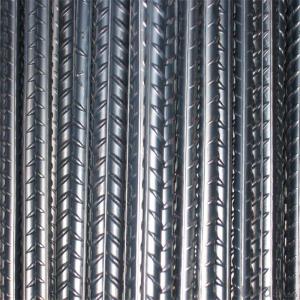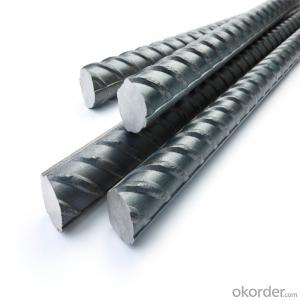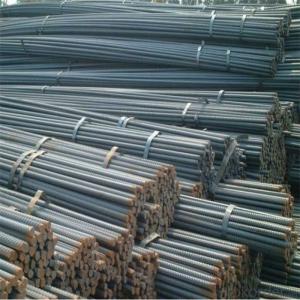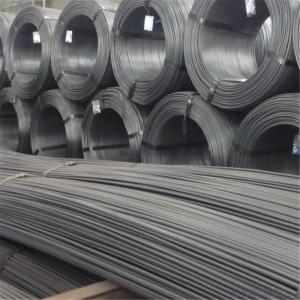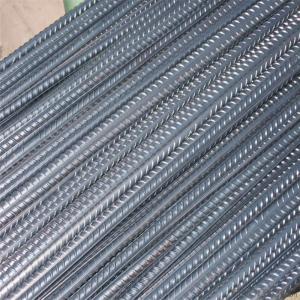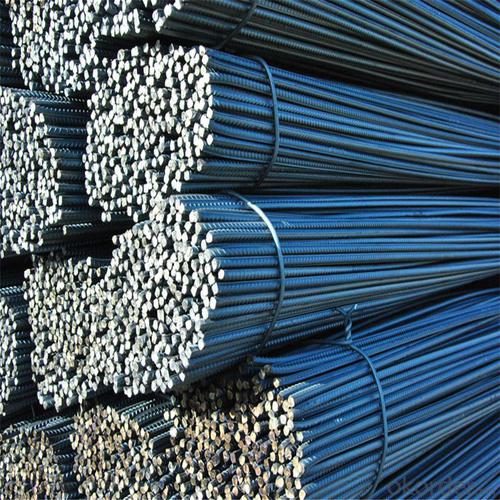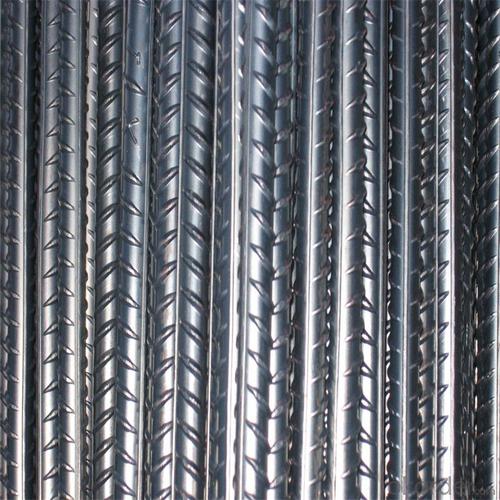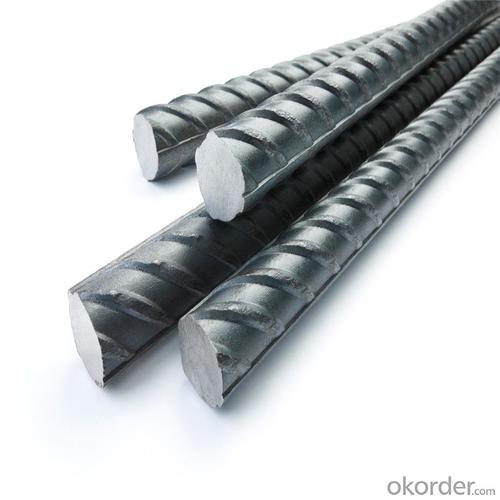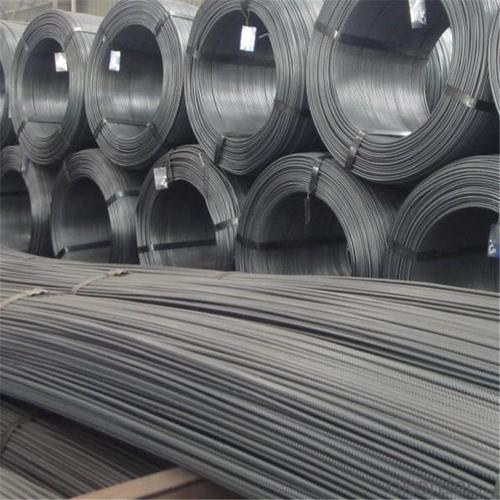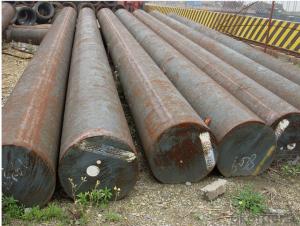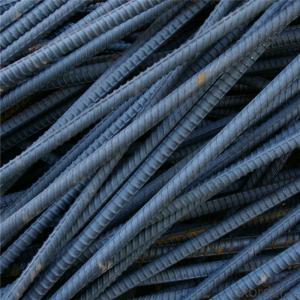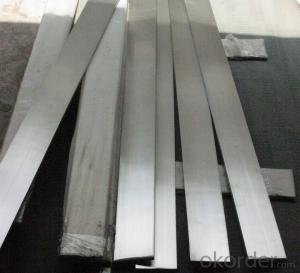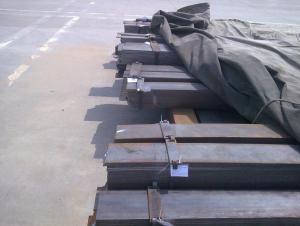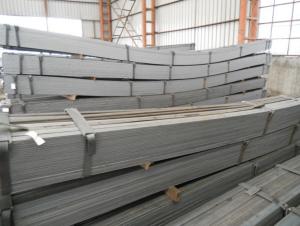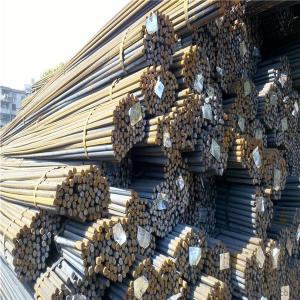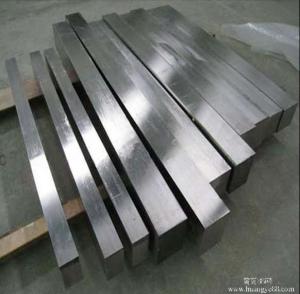Mild Deformed Steel Bar in All Sizes
- Loading Port:
- Tianjin
- Payment Terms:
- TT OR LC
- Min Order Qty:
- 180 m.t.
- Supply Capability:
- 500000 m.t./month
OKorder Service Pledge
OKorder Financial Service
You Might Also Like
Specification
Mild Deformed Steel Bar
Description of Mild Deformed Steel Bar
1, Diameter: 5.5mm-10mm Mild Deformed Steel Bar
10m- 40mm Mild Deformed Steel Bar
2, Length: 6m, 9m, 12m or customized
3, Standard: GB, ASTM, AISI, SAE, DIN, JIS, EN
OEM technology - send detailed technical parameters for accurate quotation.
2, Produce Process: smelt iron - EAF smelt billet - ESR smelt billet -
hot rolled or forged to get the steel round bar and plate
3, Heat Treatment: annealing, normalizing, tempering, quenching
4, Surface Treatment: Black
5, Quality Assurance: We accept third party inspection for all orders.
You can ask testing organizations such as SGS, BV, etc. to test our products before shipping.
Chemical Composition of Mild Deformed Steel Bar
Grade | Technical data of the original chemical composition(%) | |||||
Reinforcing steel bar HRB335 | C | Mn | Si | S | P | B |
≤0.25 | ≤1.60 | ≤0.80 | ≤0.045 | ≤0.045 | >0.0008 | |
Physics Capability | ||||||
Yield Strength(N/cm2) | Tensile Strength(N/cm2) | Elongation(%) | ||||
≥ 335 | ≥490 | ≥16 | ||||
Reinforcing steel bar HRB400 | C | Mn | Si | S | P | B |
≤0.25 | ≤0.16 | ≤0.80 | ≤0.045 | ≤0.045 | 0.04-0.12 | |
Physics Capability | ||||||
Yield Strength(N/cm2) | Tensile Strength(N/cm2) | Elongation(%) | ||||
≥ 400 | ≥ 570 | ≥ 14 | ||||
Products Show of Mild Deformed Steel Bar
Company Information
CNBM International Corporation is the most important trading platform of CNBM group.
Whith its advantages, CNBM International are mainly concentrate on Cement, Glass, Iron and Steel, Ceramics industries and devotes herself for supplying high qulity series of refractories as well as technical consultancies and logistics solutions.


F A Q
1, Your advantages?
professional products inquiry, products knowledge train (for agents), smooth goods delivery, excellent customer solution proposale
2, Test & Certificate?
SGS test is available, customer inspection before shipping is welcome, third party inspection is no problem
3, Factory or Trading Company?
CNBM is a trading company but we have so many protocol factories and CNBM works as a trading department of these factories. Also CNBM is the holding company of many factories.
4, Payment Terms?
30% TT as deposit and 70% before delivery.
Irrevocable L/C at sight.
5, Trading Terms?
EXW, FOB, CIF, FFR, CNF
6, After-sale Service?
CNBM provides the services and support you need for every step of our cooperation. We're the business partner you can trust.
For any problem, please kindly contact us at any your convenient time.
We'll reply you in our first priority within 24 hours.
- Q: How does special steel contribute to the telecommunications machinery industry?
- Special steel plays a crucial role in the telecommunications machinery industry by providing high strength, durability, and corrosion resistance. It is used in the manufacturing of various components such as towers, antennas, cables, and connectors, ensuring reliable and long-lasting infrastructure for communication networks. Additionally, special steel's exceptional electrical conductivity properties make it ideal for transmitting signals with minimal loss. Overall, special steel contributes to the telecommunications machinery industry by enabling efficient and reliable communication systems.
- Q: What are the different types of high-speed steel?
- There are several different types of high-speed steel, including M1, M2, M42, and T1. These variations have different compositions and properties, such as varying levels of tungsten, molybdenum, and vanadium, which affect their hardness, toughness, and heat resistance.
- Q: What are the requirements for special steel used in automotive parts manufacturing?
- The requirements for special steel used in automotive parts manufacturing are specific and crucial to ensure superior performance, safety, and durability of the vehicles. Here are some of the key requirements for special steel used in automotive parts manufacturing: 1. Strength and Hardness: Special steel used in automotive parts needs to have high strength and hardness to withstand the extreme stresses and loads that automotive components experience. This ensures the parts can endure heavy usage, resist deformation, and prevent failure under demanding conditions. 2. Ductility and Toughness: While being strong and hard, special steel must also possess good ductility and toughness. Ductility allows the steel to be formed and shaped into various intricate automotive parts, while toughness ensures that the parts can absorb energy and resist fracture or cracking upon impact. 3. Corrosion Resistance: Automotive parts are constantly exposed to various environmental conditions, including moisture, humidity, and road salts. Special steel used in automotive parts must exhibit excellent corrosion resistance to prevent rust and deterioration, thereby increasing the longevity and reliability of the parts. 4. Weldability: As automotive parts are often assembled through welding processes, it is essential for special steel to have good weldability. This allows for efficient and secure joining of different components, ensuring structural integrity and minimizing the risk of weld defects. 5. Heat Resistance: Special steel used in automotive parts manufacturing should have sufficient heat resistance to withstand high temperatures generated during engine operation, friction, or other thermal processes. This ensures that the steel maintains its mechanical properties even under extreme heat conditions, preventing premature failure or deformation. 6. Fatigue Strength: Automotive parts are subjected to repeated loading and unloading cycles, leading to fatigue failure if the steel does not have adequate fatigue strength. Special steel should possess high fatigue strength to withstand cyclic loading and resist fatigue cracks, enhancing the durability and reliability of the parts. 7. Dimensional Stability: Automotive parts need to maintain their shape and dimensions over time to ensure proper fit and functionality. Special steel used in manufacturing should exhibit dimensional stability, minimizing any warping or distortion during heat treatment or operational conditions. 8. Cost-effectiveness: While meeting the above requirements, special steel should also be cost-effective for automotive parts manufacturing. This means that the steel should be reasonably priced, readily available, and offer a good balance between cost and performance. Meeting these requirements is crucial for manufacturers to produce high-quality automotive parts that meet industry standards, perform optimally, and contribute to the overall safety and performance of vehicles.
- Q: Is special steel resistant to chemical corrosion?
- Special steel, which is also known as stainless steel, is typically resistant to chemical corrosion. It is an alloy that contains at least 10.5% chromium. The presence of chromium in the steel forms a protective layer on the surface, preventing corrosion. This layer is stable and shields the steel from reacting with chemicals and corrosive substances. Furthermore, special steel may contain other elements like nickel, molybdenum, and titanium. These elements enhance its resistance to chemical corrosion, enabling the steel to withstand exposure to acids, alkalis, salts, and other corrosive agents commonly found in industrial and environmental settings. Nevertheless, it is important to consider that the resistance of special steel to chemical corrosion can vary based on its grade and composition. Different grades of stainless steel offer different levels of corrosion resistance. Therefore, it is crucial to select the appropriate grade depending on the intended application and the specific corrosive environment. To summarize, although special steel generally resists chemical corrosion, the level of resistance can differ depending on the grade and composition. Hence, it is essential to assess specific requirements and seek advice from experts to choose the most suitable special steel for a particular application.
- Q: Can special steel be used for automotive engine components?
- Yes, special steel can be used for automotive engine components. Special steels such as high-strength, heat-resistant, and corrosion-resistant alloys are often employed in manufacturing engine components to ensure durability, performance, and efficiency under demanding conditions.
- Q: What are the requirements for special steel used in corrosive environments?
- To ensure durability and performance in corrosive environments, special steels must possess specific properties. The requirements for these steels can be summarized as follows: 1. Excellent corrosion resistance is the primary requirement. The steels should be able to withstand aggressive substances like acids, alkalis, and salts without showing signs of corrosion. This ensures the longevity of the steel and maintains its performance. 2. High strength is crucial for handling mechanical stresses imposed on the steel in corrosive environments. It is particularly important for applications with heavy loads, pressures, or impacts, as it helps maintain the steel's integrity and structural stability. 3. Resistance to pitting and crevice corrosion is essential. These localized forms of corrosion can occur in the presence of certain aggressive chemicals or stagnant environments. Steels should be resistant to such forms of corrosion to prevent localized damage and potential failure. 4. Resistance to stress corrosion cracking is necessary. This phenomenon occurs when a corrosive environment compromises the material's integrity under tensile stress. Special steels should be resistant to stress corrosion cracking to ensure reliability under applied loads. 5. Good resistance to intergranular corrosion is important. This type of corrosion along grain boundaries weakens the material. Special steels used in corrosive environments should have resistance to intergranular corrosion to maintain structural integrity. 6. Thermal stability is essential for high-temperature corrosive environments. Special steels should exhibit thermal stability to resist degradation and maintain their properties in elevated temperatures. 7. Ease of maintenance is a desirable characteristic. Special steels used in corrosive environments should be relatively easy to clean, resistant to fouling or scaling, and compatible with commonly used cleaning agents or procedures in the industry. It is important to note that the specific requirements for special steels in corrosive environments may vary depending on the application and type of corrosive substances encountered. Therefore, careful consideration of specific needs and consultation with experts in the field is crucial for selecting the most appropriate steel for each corrosive environment.
- Q: How is corrosion-resistant steel used in marine applications?
- Corrosion-resistant steel is widely used in marine applications due to its ability to withstand the harsh and corrosive environment of seawater. It is used in the construction of various marine structures such as ship hulls, offshore platforms, and underwater pipelines. The steel's unique composition, usually containing elements like chromium, nickel, and molybdenum, forms a protective oxide layer on its surface, preventing corrosion and maintaining its structural integrity over a long period. This helps to improve the durability, longevity, and overall performance of marine equipment and structures, reducing maintenance costs and ensuring safety in maritime operations.
- Q: What are the requirements for special steel used in ballistic protection?
- The requirements for special steel used in ballistic protection include high strength and hardness, excellent toughness, good weldability, and resistance to deformation and cracking under high impact loads. It should also possess low weight, good formability, and corrosion resistance to ensure long-term durability and performance. Additionally, the steel must meet specific ballistic standards such as withstanding penetration from high-velocity projectiles and providing effective protection against ballistic threats.
- Q: How does special steel contribute to the defense aftermarket industry?
- Special steel plays a crucial role in the defense aftermarket industry by providing high-quality materials that are essential for the production of various defense equipment and components. The unique properties of special steel, such as its exceptional strength, durability, and resistance to corrosion and extreme temperatures, make it a preferred choice for manufacturing military vehicles, aircraft, weapons, and other defense systems. One of the key ways in which special steel contributes to the defense aftermarket industry is through its use in armor and ballistic protection. Special steel alloys are utilized to create armor plates and panels that can withstand high-velocity impacts and protect military personnel and vehicles from enemy fire. These materials offer enhanced protection levels, reducing the risk of casualties and damage during combat. Moreover, special steel is also employed in the production of aerospace components. The defense industry heavily relies on aircraft for various operations, including reconnaissance, surveillance, and combat. Special steel alloys are used to manufacture critical components such as landing gear, engine parts, and structural elements, ensuring the safety, reliability, and performance of military aircraft. Furthermore, special steel's resistance to corrosion and extreme conditions makes it suitable for the construction of naval vessels and submarines. These naval assets operate in harsh marine environments, exposed to saltwater, extreme temperatures, and constant mechanical stress. Special steel alloys with high-strength properties and corrosion resistance are utilized in the construction of ship hulls, propeller shafts, and other critical components, ensuring longevity and operational effectiveness. In addition to its direct applications, special steel also contributes to the defense aftermarket industry through its role in the supply chain. The production of defense equipment and components often requires highly specialized machinery and tools, which are made from special steel. The availability of these materials is essential for maintaining a robust defense industry, enabling the efficient production and maintenance of defense systems. Overall, special steel plays a vital role in the defense aftermarket industry by providing the necessary materials for the production of high-performance, reliable, and durable defense equipment. Its unique properties contribute to the safety, effectiveness, and longevity of military vehicles, aircraft, weapons, and naval vessels, ultimately enhancing the capabilities of defense forces around the world.
- Q: What are the different corrosion-resistant special steel alloys?
- There are several corrosion-resistant special steel alloys that are commonly used in various industries. Some of the most popular ones include stainless steel, duplex stainless steel, super duplex stainless steel, and nickel-based alloys. Stainless steel is a widely used corrosion-resistant alloy that contains a minimum of 10.5% chromium. It forms a protective layer of chromium oxide on its surface, preventing further corrosion. Stainless steel is highly resistant to rust, staining, and pitting, making it suitable for applications in the food processing, chemical, and marine industries. Duplex stainless steel is a combination of both austenitic and ferritic stainless steels. It offers excellent resistance to corrosion, particularly in environments with high chloride ion concentrations. Duplex stainless steel is commonly used in the oil and gas, chemical, and desalination industries. Super duplex stainless steel is a higher strength version of duplex stainless steel. It offers enhanced corrosion resistance and mechanical properties, making it ideal for applications in harsh environments such as offshore oil and gas platforms, chemical processing plants, and seawater desalination systems. Nickel-based alloys, such as Inconel and Hastelloy, are known for their exceptional resistance to corrosion and high-temperature environments. These alloys are commonly used in industries such as aerospace, chemical processing, and power generation, where resistance to both corrosion and heat is critical. These corrosion-resistant special steel alloys provide various options for industries that require materials with excellent durability and resistance to corrosive environments. The choice of alloy depends on the specific application, operating conditions, and desired performance characteristics.
Send your message to us
Mild Deformed Steel Bar in All Sizes
- Loading Port:
- Tianjin
- Payment Terms:
- TT OR LC
- Min Order Qty:
- 180 m.t.
- Supply Capability:
- 500000 m.t./month
OKorder Service Pledge
OKorder Financial Service
Similar products
Hot products
Hot Searches
Related keywords

